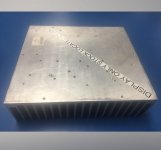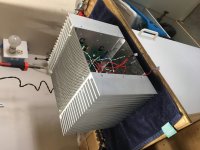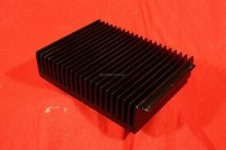I have a local electronics store that has some 8x9 heatsinks for $22 each and I have used some of them for Amp Camps by cutting them down and I did a set with a pair on each with no problems.
The heatsinks on DiyAudio are 40mm (1.5 inches), and these are 80mm (3 inch), so the total dimensions are 8x9x3.
Would these work for an F4, F5, or F6 build given the larger fins?
Thanks.
Dustin
The heatsinks on DiyAudio are 40mm (1.5 inches), and these are 80mm (3 inch), so the total dimensions are 8x9x3.
Would these work for an F4, F5, or F6 build given the larger fins?
Thanks.
Dustin
Attached are pics. The reason they are only $22 is they were pre-drilled with random tapped holes but I can easily work around them.
I mounted 2 amp camp boards to two of them to run as a 4 channel amp or bridged and it stays cooler than the 40mm heatsinks.
I’ll have to weigh them when I get home
I mounted 2 amp camp boards to two of them to run as a 4 channel amp or bridged and it stays cooler than the 40mm heatsinks.
I’ll have to weigh them when I get home
Attachments
that one will get rid of 80W of heat , which is max of FW (regular ones) per channel
if needed in summer , just add Babysitter
if needed in summer , just add Babysitter
Same question, different heatsinks
I picked up four heatsinks a while back that are 11 pounds of black aluminum with vertical fins, 10.25" x 8.125" x 2.66" with a number of already tapped holes. I don't know the thermal properties, but based on the size I think they should be more than sufficient for F7 monoblocks with two heatsinks per channel. But would two heatsinks be enough for a stereo amp, with one channel per heatsink? Is there an easy way to calculate the thermal properties, or is it easier to just build it and measure?
I picked up four heatsinks a while back that are 11 pounds of black aluminum with vertical fins, 10.25" x 8.125" x 2.66" with a number of already tapped holes. I don't know the thermal properties, but based on the size I think they should be more than sufficient for F7 monoblocks with two heatsinks per channel. But would two heatsinks be enough for a stereo amp, with one channel per heatsink? Is there an easy way to calculate the thermal properties, or is it easier to just build it and measure?
Attachments
Search for a thermal resistance calculator, I've seen them for a simple plate/fin style sinks.
Here's a link to the HiFi2000 chassis spec's as a reference.
Here's a link to the HiFi2000 chassis spec's as a reference.
I used the calculator at Thermal Resistance Calculator for Plate Fin Heat Sink to get a ballpark figure, but I don't know what airflow rate to assume for passive use. The lowest airflow listed in the results in 100 LFM (the calculator does not provide a 0 LFM output), which gives a thermal resistance of 0.24 degrees C/W.
I don't know how to adjust for two transistors per sink instead of a single point source. In the F5 manual, Nelson specifies a heatsink of 0.6 degrees C/W for each transistor, roughly 8" x 6" X 2". So my heatsinks are clearly excessive for one transistor per sink, and borderline for two.
I don't know how to adjust for two transistors per sink instead of a single point source. In the F5 manual, Nelson specifies a heatsink of 0.6 degrees C/W for each transistor, roughly 8" x 6" X 2". So my heatsinks are clearly excessive for one transistor per sink, and borderline for two.
Rod Elliott's ESP / Sounds website has an excel spread sheet calculator you could try.
Thanks! Very helpful, especially this part:
"The most accurate way to determine the thermal resistance of an unknown heatsink is to measure it."
Fortunately guidelines how to do this follow.
I picked up four heatsinks a while back that are 11 pounds of black aluminum with vertical fins, 10.25" x 8.125" x 2.66" with a number of already tapped holes. I don't know the thermal properties, but based on the size I think they should be more than sufficient for F7 monoblocks with two heatsinks per channel. But would two heatsinks be enough for a stereo amp, with one channel per heatsink? Is there an easy way to calculate the thermal properties, or is it easier to just build it and measure?
I have the same heatsinks (6 of them) and tested. This heatsink could handle 80-90W each (but with a little higher temp.). If someone would use this heatsink for a commercial amp, it would probably be a little less than 80W. I think OP's heatsink is OK for around 80W, if the height is 8" (9" length).
I have the same heatsinks (6 of them) and tested. This heatsink could handle 80-90W each (but with a little higher temp.). If someone would use this heatsink for a commercial amp, it would probably be a little less than 80W. I think OP's heatsink is OK for around 80W, if the height is 8" (9" length).
Awesome. Thanks! I was hoping for a response from someone with similar heat sinks, but exact the same is even better.
Awesome. Thanks! I was hoping for a response from someone with similar heat sinks, but exact the same is even better.
jamayfie, I want to add some more information about above post I did.
The heatsink was tested with 2xSony SIT (2x40W to2x45W) and the heatsink temp was barely acceptable level (45C or so). I was expecting the heatsink could handle a little more than that, so I was a little disappointed, but I still think it can handle more than 100W each when a pair of them are inserted in the metal case because the other part of the case should handle extra watt.
I checked DIYAUDIO store case, and their 4U heatsink (11.8x6.3x1.5) has been reported ok for Aleph J (100Wx2), and their paper says it can handle 130W each when 4 TO3-P on each heatsink.
https://cdn.shopify.com/s/files/1/1...o_potenze_dissipanti.pdf?12500389275417700142
I think our heatsinks in the metal case are equivalent of those 4U heatsinks, or should perform a little better due to very thick base plate and extra surface area.
Someone correct me if I'm wrong.
Anyway, I remember that those heatsinks were sold at very low price w/free shipping on Ebay, and my greediness couldn't let them go. 😀
Thanks! Very helpful, especially this part:
"The most accurate way to determine the thermal resistance of an unknown heatsink is to measure it."
Fortunately guidelines how to do this follow.
I'm not sure that you found the prize:
ESP Download Page
- Home
- Amplifiers
- Pass Labs
- Will these heatsinks Work on Pass?




